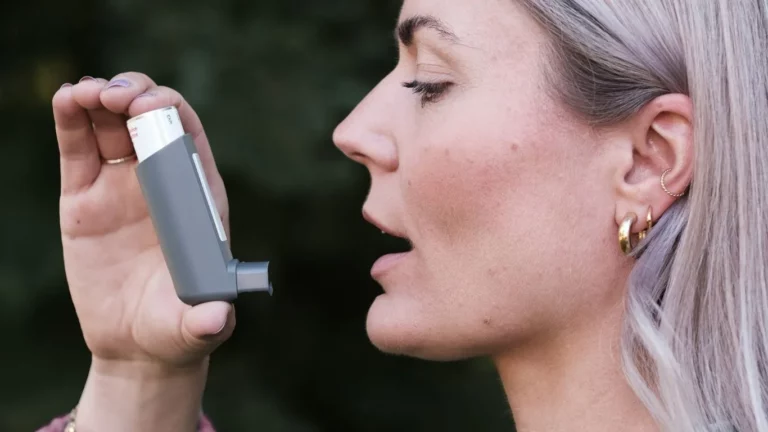How to Tell if Your Cough is from Asthma or Allergies – Simple Guide
As a Pulmonary Nurse, I’ve encountered countless patients who’ve struggled with the frustration of not knowing whether their persistent cough is caused by asthma, allergies, or something else. Let’s face it—coughing is one of those symptoms that can really make you feel miserable, but figuring out whether it’s related to asthma or allergies can be tricky. Trust me, it’s something I’ve helped many people sort out over the years, and it’s not always as straightforward as it seems. If you’ve found yourself wondering, “How to tell if a cough is from asthma or allergies?” you’re definitely not alone. Both conditions can cause similar symptoms, but they have key differences that can help you figure out what’s really going on. In this article, we’ll walk through some of those differences, share a bit of my personal experience, and give you some practical tips for understanding the causes behind your cough. So, let’s get into it!
What’s the Difference Between Asthma and Allergies?

Before we dive into how to pinpoint the cause of your cough, it’s important to understand the basics of asthma and allergies. I know, it sounds basic, but trust me—getting clear on what each condition really is can help you recognize the symptoms more easily. So here’s the deal:
- Asthma is a chronic condition that affects your airways. When you have asthma, the airways in your lungs become inflamed and narrow, making it harder for air to flow in and out. This inflammation can lead to symptoms like wheezing, shortness of breath, chest tightness, and yes—coughing. Asthma tends to be triggered by various factors such as cold air, exercise, infections, and even strong smells.
- Allergies occur when your immune system overreacts to a substance that it mistakenly identifies as harmful. Things like pollen, dust mites, pet dander, and mold are common allergens. When you come into contact with these triggers, your body releases chemicals (like histamine) that cause symptoms such as sneezing, runny nose, itchy eyes, and coughing.
While both asthma and allergies can involve coughing, understanding these basic definitions will help you recognize the subtle differences in how they affect you or someone else.
Common Symptoms of Asthma

If you’re wondering how to tell if your cough is asthma-related, you’ll want to watch for some specific signs. Asthma tends to cause a persistent cough that often worsens at night or early in the morning. This can be particularly troublesome if you’re waking up in the middle of the night with that feeling of tightness in your chest, like someone’s sitting on it. Some people describe it as a “barky” cough, especially when it’s at its worst.
- Wheezing: You know that whistling or high-pitched sound you hear when breathing? That’s called wheezing, and it’s a classic sign of asthma. If you hear that while coughing or breathing, it’s pretty likely that asthma is the culprit.
- Chest Tightness: Many asthma patients report a feeling of tightness or pressure in the chest, which can be more pronounced when coughing.
- Difficulty Breathing: If your cough is paired with difficulty catching your breath or feeling like you can’t get enough air, it’s likely asthma-related.
- Seasonal or Trigger-Related Flare-Ups: Asthma is often triggered by things like changes in the weather, exercise, or exposure to irritants like smoke or strong odors.
In my experience, asthma symptoms often show up or get worse during colder months or after physical activity. But it’s important to note that everyone’s asthma triggers are a little different, so your experience might vary.
Common Symptoms of Allergies

On the other hand, if you’re dealing with a cough caused by allergies, there are a few key signs that can help distinguish it. Allergy-induced coughs are often dry and tickly, without the wheezing or tightness that you get with asthma. You may also notice other allergy symptoms like a runny nose, itchy eyes, and sneezing. Coughing is often a result of postnasal drip, where mucus from the nose drips down the back of the throat and irritates it.
- Itchy Eyes or Throat: One of the most noticeable signs of allergies is that itchy, scratchy feeling in the throat and eyes. This usually comes with sneezing and a stuffy nose.
- Clear, Watery Mucus: Allergies often cause a runny nose, and the mucus is usually clear or watery. If you’re coughing up thick, yellow or green mucus, it could point to something else.
- Seasonal Triggering: Allergies tend to flare up during certain seasons, especially spring and fall when pollen counts are high. If your cough seems to appear only during specific times of the year, allergies could be the cause.
In my practice, I’ve seen a lot of patients who have allergic rhinitis (that’s just a fancy term for allergy-related nasal issues) and end up coughing because of the postnasal drip. If your cough is constant but not accompanied by the tightness or wheezing you might expect with asthma, allergies could very well be at play.
How to Tell if a Cough is from Asthma or Allergies: What to Look For

So, now that we’ve covered the basics of asthma and allergies, let’s talk about the practical stuff—how can you actually figure out whether your cough is from asthma or allergies? If you’ve been coughing for a while and can’t seem to figure out the cause, I get it—this is where things can get a bit tricky. The good news is that there are some key things to look out for that can help guide you in the right direction. And, in my experience as a Pulmonary Nurse, many people don’t realize how small differences in their symptoms can really point to one or the other. Here’s how to start narrowing it down:
When Your Cough Is Triggered: Timing Is Everything
One of the first things I tell my patients to pay attention to is when their cough occurs. The timing of your symptoms can provide a huge clue as to whether asthma or allergies is at play.
- Asthma-related coughs are often triggered by certain factors like cold air, physical activity, or exposure to irritants like smoke or chemicals. You might notice your cough flaring up after a brisk walk outside or even when you’re just heading out into a cold breeze. If you’re finding that your cough is especially bothersome at night or early in the morning, that’s also a red flag for asthma. In fact, many of my asthma patients report waking up with a tight chest and coughing that gets worse as the night goes on.
- Allergy-related coughs, on the other hand, tend to be more seasonal and triggered by allergens like pollen, dust, pet dander, or mold. If your cough starts in the spring or fall when pollen levels are high, or if it gets worse when you’re around pets or in dusty environments, it’s likely due to allergies. I’ve seen this time and again—people don’t always connect the dots between their surroundings and their symptoms, but once they do, it becomes much clearer.
For example, I once worked with a patient who swore their cough was related to a cold, but after we talked about the timing and triggers, they realized their symptoms were worsening each year when the trees started blooming. It turned out, they were dealing with seasonal allergies all along. Being aware of these triggers can make a big difference in pinpointing the cause.
How Your Cough Feels: The Texture and Sound
The next thing to pay attention to is the type of cough you’re experiencing. Asthma and allergy-related coughs feel a little different from one another, and recognizing these subtle differences can help you get closer to the right diagnosis.
- Asthma coughs are typically deep and can be either dry or productive (meaning you cough up mucus). However, what sets an asthma-related cough apart is that it often comes with a characteristic wheeze—a high-pitched whistle sound when breathing out. If you’ve ever heard that sound yourself or from someone else, you know what I’m talking about. The cough can feel tight, like something is constricting your chest, and the wheezing or breathlessness usually comes with it. This combination of symptoms is a hallmark sign of asthma. Asthma-related coughs can also become worse after physical exertion or during the night.
- Allergy coughs, however, tend to be a bit different. They’re often described as more of a tickling, dry, or hacking cough that doesn’t come with wheezing. If you find yourself coughing in a dry, repetitive way, with no chest tightness or wheezing, allergies might be to blame. As I mentioned before, allergy-induced coughing is also linked to postnasal drip, so you might feel the urge to clear your throat or cough because of mucus dripping down from your sinuses. In my experience, this type of cough tends to be a bit more persistent, especially when you’re in an environment where allergens are present.
Both types of coughs are annoying, but paying attention to how the cough feels can give you more insight into what’s going on inside your lungs or sinuses.
Other Symptoms You Can’t Ignore
Beyond the cough itself, there are a few other symptoms that can help you determine if asthma or allergies is to blame. In my practice, I always encourage people to consider the full range of symptoms they’re experiencing—not just the cough.
- For asthma: If you’re also dealing with shortness of breath, wheezing, or a feeling of tightness in your chest, it’s much more likely that your cough is related to asthma. I’ve had many patients who initially dismissed their chest tightness as a result of stress, but once they started using an inhaler and noticed their symptoms improving, they realized it was asthma all along.
- For allergies: If you also have a runny or stuffy nose, itchy eyes, sneezing, or even a sore throat, allergies are probably your culprit. I’ve worked with a lot of patients who were convinced their coughing was just due to a viral infection, but once we addressed their allergy symptoms, their cough cleared up. If you notice that your symptoms vary based on the time of year or exposure to certain environments, that’s another big clue that allergies are the issue.
Keep track of any extra symptoms you’re experiencing, and don’t hesitate to mention them to your doctor or nurse. The more information you provide, the easier it will be for a healthcare professional to help you get the right treatment.
What You Can Do Right Now: Getting Some Relief

If you’re struggling with a persistent cough and can’t quite figure out whether it’s asthma or allergies, here are a few things you can do in the meantime to get some relief while you sort it out:
- For asthma: If you suspect your cough is related to asthma, it’s important to use any prescribed inhalers or medications as directed. If you haven’t seen a doctor yet, it’s a good idea to schedule an appointment for an asthma evaluation. Asthma can be managed effectively with the right treatment plan, and your healthcare provider will help you find what works best for you.
- For allergies: Over-the-counter antihistamines or nasal sprays can help relieve allergy symptoms. If you’re in a particularly allergen-heavy environment (like around pets or in a dusty room), try to limit your exposure as much as possible. Using air purifiers and keeping windows closed during peak pollen seasons can also help.
Whatever the cause, remember—managing your symptoms is key. Whether it’s asthma or allergies, there’s always something you can do to improve your quality of life. And if you’re ever in doubt, don’t hesitate to reach out to a healthcare professional to help you get to the bottom of it. Trust me, it’s worth it.
When to See a Doctor: Getting the Right Diagnosis for Your Cough

Alright, by now you probably have a better idea of whether your cough is more likely related to asthma or allergies. But, let’s be real—there are still plenty of unknowns, and this is when the advice from a healthcare professional can be a game-changer. Knowing when to see a doctor is crucial, because a proper diagnosis and treatment plan can help you manage your symptoms and get back to feeling like yourself.
In my years as a Pulmonary Nurse, I’ve encountered countless patients who’ve been unsure about their symptoms, and it’s always been a relief when they finally get clarity. Here’s the thing: if your cough is persistent, worsens over time, or is interfering with your daily life, it’s time to make an appointment. Here’s a simple breakdown of when you should really seek help:
- If your cough lasts more than a few weeks: A cough that lingers for weeks (especially if it doesn’t seem to get better) could indicate an underlying condition like asthma, allergies, or even something more serious. While some coughs are just a result of a mild cold or flu, a cough that sticks around can be a sign that it’s time to see a doctor. I’ve seen so many patients wait too long, and by the time they come in, their asthma is uncontrolled or their allergies are much worse.
- If you experience wheezing or shortness of breath: If your cough is accompanied by difficulty breathing, tightness in your chest, or wheezing, this could be a sign of asthma. Asthma needs proper management, and ignoring symptoms can lead to more severe flare-ups. It’s better to get it checked early. Plus, if you’re having trouble breathing, it’s always best to err on the side of caution.
- If your cough is severe and produces mucus: This is especially important if you notice you’re coughing up yellow or green mucus, which could indicate an infection or another issue that needs medical attention. This could be a sign of a secondary infection, like a sinus infection or bronchitis, which may need antibiotics or specific treatment.
- If over-the-counter treatments aren’t working: Whether you’re trying allergy meds or asthma inhalers, if you don’t see any improvement or your symptoms keep coming back, it’s time to seek professional advice. A doctor can provide a more tailored approach, such as adjusting medications or recommending additional treatments that you might not have tried yet.
Remember, there’s no shame in seeking help. Doctors and nurses are there to support you, and getting to the root cause of your cough is important for long-term health. Asthma and allergies can both be managed effectively with the right care plan, and the sooner you get help, the sooner you can start feeling better.
Common Treatments for Asthma and Allergies

Now, I know what you’re thinking—“Okay, but how do I actually treat this stuff?” Whether you end up dealing with asthma, allergies, or both, the good news is that there are a variety of treatments available to help you feel better. As a nurse who’s worked with many patients over the years, I can tell you that the treatment process isn’t one-size-fits-all. But the right combination of approaches can make a world of difference in managing symptoms.
For Asthma
When it comes to treating asthma, the main goal is to keep your airways open and reduce inflammation. There are two key types of medications that are often used:
- Quick-relief (Rescue) Medications: These are used to relieve acute asthma symptoms, such as wheezing or difficulty breathing. The most common type of quick-relief medication is a short-acting bronchodilator like albuterol, which works by relaxing the muscles around your airways to help you breathe easier.
- Long-term Control Medications: These are used to manage asthma over time by reducing inflammation and preventing asthma attacks. Inhaled corticosteroids (like fluticasone) are often prescribed to reduce airway inflammation. There are also other options, like leukotriene modifiers, long-acting bronchodilators, and biologic treatments, which target specific immune system pathways involved in asthma.
In addition to medications, your doctor might recommend lifestyle changes, such as avoiding asthma triggers (like smoke, strong smells, or allergens). They may also suggest using an inhaler on a regular basis to keep symptoms under control.
For Allergies
When it comes to managing allergies, the main goal is to reduce your immune system’s overreaction to allergens and relieve symptoms. Some of the most common treatments include:
- Antihistamines: These are commonly used to relieve allergy symptoms like sneezing, itching, and runny nose. Some antihistamines are available over the counter, like cetirizine (Zyrtec) and loratadine (Claritin), while others require a prescription.
- Nasal Sprays: Nasal corticosteroid sprays (like fluticasone) are effective in reducing inflammation in the nasal passages, which helps with congestion, sneezing, and runny nose.
- Decongestants: These medications can help reduce nasal congestion, but they’re typically recommended for short-term use to avoid side effects like increased heart rate or insomnia.
- Immunotherapy (Allergy Shots): If your allergies are severe and don’t respond well to medications, your doctor may recommend immunotherapy, which involves getting regular allergy shots to gradually desensitize your immune system to specific allergens.
Managing allergies also involves avoiding known allergens as much as possible—especially in environments where you can’t control the air quality, like in your workplace or home. In some cases, using an air purifier or staying indoors during peak pollen seasons can help minimize symptoms.
References & Resources for More Information
If you’re still unsure about whether your cough is from asthma or allergies, or if you want to learn more about treatment options, here are some trusted resources that can provide you with more information:
- Health.com
- National Institutes of Health (NIH)
- Asthma and Allergy Foundation of America
- Centers for Disease Control and Prevention (CDC)
Disclaimer
The information provided in this article is for educational purposes only and is not intended as a substitute for professional medical advice, diagnosis, or treatment. Always seek the advice of your physician or other qualified health provider with any questions you may have regarding a medical condition. Never disregard professional medical advice or delay seeking it because of something you have read in this article. If you think you may have a medical emergency, call your doctor or emergency services immediately.

Bianca Nala is a compassionate Nurse Practitioner with a strong background in primary and respiratory care. As a health writer for Healthusias.com, she combines her clinical expertise with a talent for clear, relatable storytelling to help readers better understand their health. Bianca focuses on topics like asthma, COPD, chronic cough, and overall lung health, aiming to simplify complex medical topics without losing accuracy. Whether she’s treating patients or writing articles, Bianca is driven by a single goal: making quality healthcare knowledge accessible to everyone.







